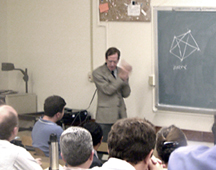Partly Random Graphs and Small World Networks
| |
Introductory Remarks by Provost David Colburn | |
| Room: Little Hall 109 |  |
|---|---|
| Date: Monday, January 10, 2000 | |
| Time: 4:00-5:00PM | |
| Cookies and Coffee: at 3:30 in Little Hall 339 (The Atrium) | |
Abstract: | |
| It is almost true that any two people in the US are connected by less than six steps from one friend to another. What are models for large graphs with such small diameters? Watts and Strogatz observed (in Nature, June 1998) that a few random edges in a graph could quickly reduce its diameter (longest distance between two nodes). We report on an analysis by Newman and Watts (using mathematics of physicists) to estimate the diameter with an N-cycle and M random shortcuts, 1 << M << N. | |
| Gilbert Strang was an undergraduate at MIT and a Rhodes Scholar at Balliol College, Oxford. His Ph.D was from UCLA and since then he has taught at MIT. He has been a Sloan Fellow and a Fairchild Scholar and is a Fellow of the American Academy of Arts and Sciences. His is a Professor of Mathematics at MIT and an Honorary Fellow of Balliol College. | |
1999 Ulam Colloq *
Strang's Teaching Seminar *
Strang's Applied Math Seminar Strang at his Ulam colloquium University of Florida * Mathematics * Contact Info | |
|
Please report problems to:
www@math.ufl.edu
This page was last modified on Janary 7, 2000. | |